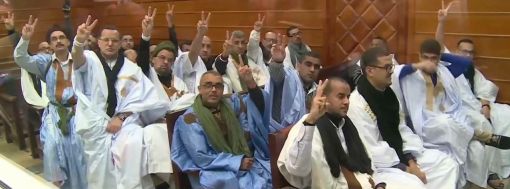
Get the latest information about the court case against the Gdeim Izik prisoners from occupied Western Sahara. Continuously updated.
Day 13 of the appeal takes place on 8 May 2017.

Contact us via info@vest-sahara.no, and we connect you with them.
The 'Gdeim Izik group' consists of 25 central activists from Western Sahara, and activists which served as leaders at the so-called Gdeim Izik protest camp in 2010. The protest camp Gdeim Izik was a peaceful demonstration, where thousands of Saharawi's demanded the fulfilment of both the most basic human rights, and the right of self-determination.
The Gdeim Izik camp was violently dismantled by the Moroccan authorities in November 2010, and the group of Gdeim Izik are charged with the murder of 11 policemen, who died during the clashes upon the dismantlement of the camp. The accused are furthermore charged with belonging to a criminal organisation, as the protest camp is proclaimed as a criminal organisation and not as a protest camp.
Follow the court case, day by day
Day 1, 26 December 2016.
Day 2, 23 January 2017.
Day 3, 24 January 2017.
Day 4, 25 January 2017.
Day 5, 13 March 2017.
Day 6, 14 March 2017.
Day 7, 15 March 2017.
Day 8, 20 March 2017.
Day 9, 21 March 2017.
Day 10, 22 March 2017.
Day 11, 23 March 2017
Day 12, 27 March 2017
Day 13, 8 May 2017
Day 14, 9 Mai 2017 [To be updated]
On the 17th of February 2013, the Military Court in Rabat sentenced the group to harsh penalties. The Moroccan Court de Cassation later found the decision from the Military Court of Rabat null and void, and referred the case to the Court of Appeal in Rabat.
The Court of Appeal was on the 26th of December 2016 to address the appeal of the case of these 24 men. One of the original 25 was sentenced to life in absentia in 2013 and was not included in the new trial. Two of the accused was in 2013 sentenced to time served, and there are therefore 21 detainees. The ones sentenced to time served in 2013 are included in the new trial; and there are therefore 24 accused.
The proceedings against the "Gdeim Izik group" is therefore to be regarded as a political trial; proceedings brought up for reasons of political persecution rather than to impart justice. Furthermore; there is a blatant absence of proof against the defendants, and a great risk that the proceedings as a whole may be unfair.
Download a report from the appeals process by the two international observers Tone Sørfonn Moe (Norway) and Isabel Lourenco (Portugal), dated 17 March 2017.
The accused are presented as terrorists in Moroccan media both by the civil party and the prosecution. Inside the courtroom, both the prosecution and the civil party, raise questions about their relationship to Algeria, Polisario Front and their political views.
All the defendants are questioned about confessions retrieved through torture. All questions that bring forward content from these confessions are to be regarded as violation of art. 15 of the Convention Against Torture, where confessions retrieved through torture are regarded as illegal evidence.
In 2016, the Committee against Torture of the UN Human Rights Committee pronounced that one of the prisoners of the group had been severely tortured upon arrest and confession. He was later sentenced to 30 years in jail for the crimes that happened while he in fact was in jail, subjected to torture.
"The international agreements are not a legal binding instrument in my court room, and I do not regard the decision from the Committee against Torture as any legal binding evidence", the judge in the appeal stated in January.
Read more about each individual in the group.
NY Check new Western Sahara poster!
“Try to Visit Western Sahara”…
The Security Council fails Western Sahara and international law
On 31 October 2025, a new resolution was adopted in the UN Security Council calling on the Saharawis to negotiate a solution that would entail their incorporation into the occupying power, Morocco.
Saharawis Demonstrate Against Trump Proposal
The United States has proposed in a meeting of the UN Security Council on Thursday that the occupied Western Sahara be incorporated into Morocco.
Skretting Turkey misled about sustainability
Dutch-Norwegian fish feed giant admits using conflict fishmeal from occupied Western Sahara. Last month, it removed a fake sustainability claim from its website.



